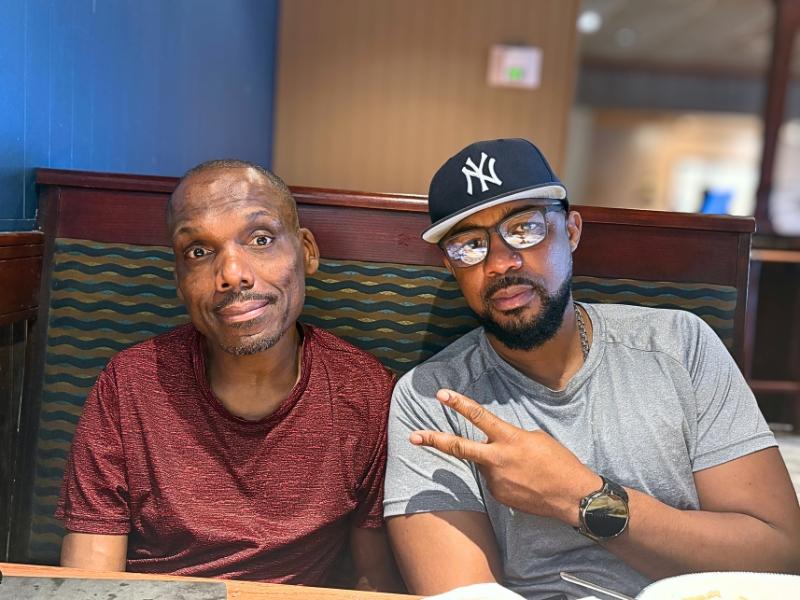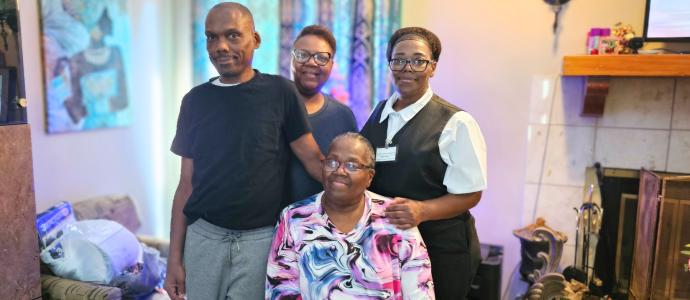This summer, James Keys finally made the long-awaited trip to visit his family in Alabama. Determined to make it happen, he carefully saved up for the trip, cutting back on small purchases along the way. “This was no small feat,” said Francine Wilson, YAI’s Brooklyn Regional Deputy Director. “James usually spends his funds quickly, but this time he was motivated, saying things like, ‘I don’t need two slices of pizza, just one.’”
Staff then stepped up to make it a reality. Both of Keys’s longtime program supervisors, Kcasey Ruddock and Julian Clarke, had never been to the Heart of Dixie, but they volunteered to drive the 18 hours so Keys could see his mother and sisters.

Keys’s story is just one example of YAI staff’s dedication to helping people with intellectual and developmental disabilities (I/DD) live full, connected lives. Staff across YAI’s programs consistently go above and beyond to preserve meaningful relationships— whether by supporting a Hudson Valley resident's weeklong trip to California to visit a beloved former staff member or by reuniting two former roommates of nearly 40 years for a special lunch date.
“When we finally got there and James saw his mom for the first time in years, the gratitude she showed us was overwhelming,” Ruddock said. “I would do this 100 times over; it was priceless to witness that reunion between mother and son.”
For Clarke and Ruddock, they took the opportunity to explore some of the state’s rich history. One of the most meaningful stops was the Legacy Museum, where they toured exhibits on slavery, segregation, and mass incarceration. “It was a big experience for us,” Ruddock said. “To be able to share that moment with James, to learn and experience it together, made the trip even more impactful.”
Food became another adventure. Keys, usually a picky eater, embraced local staples he had talked about for years. “James always used to talk about certain foods and places he knew from growing up, and then actually visiting them, you see exactly what he meant,” Clarke said. Over the week, Keys tried grits with cheese, biscuits and gravy, collard greens, cornbread, and an all-you-can-eat soul food buffet. For someone who typically stuck to a handful of safe foods, this was a big step. “We all came back at least 10 pounds heavier,” Clarke joked.
Keys also made more choices for himself, like shopping at Walmart, cooking in the Airbnb kitchen, and planning which restaurants to try. Staff discovered another hidden skill on the trip: Keys knows how to swim. Since returning to New York, swimming has since become a regular activity at a local indoor pool. “It allowed me to see how much more he can do for himself,” Clarke said. “These are things we find out only when going on vacation.”
Research shows just how powerful these experiences can be. A 2024 study from the Journal of Developmental and Physical Disabilities found that engagement levels increased by 70% when people with I/DD were given the chance to choose their preferred leisure activities. Other studies indicate that community-based recreation leads to a 63% reduction in challenging behaviors and measurable improvements in communication and social skills.
A trip like this would have been unimaginable a decade ago. When Clarke first met Keys in 2014, he was institutionalized at Brooklyn Developmental Center, where behavioral challenges often required strict interventions.
“I’ll never forget my second day on the job,” Clarke recalled. “James ran out onto the Belt Parkway, and I had to chase him down. I thought, ‘What did I get myself into?’” Over the years, as James moved into a YAI residence in Brooklyn and staff focused on person-centered supports, the picture changed dramatically. “He’s grown tremendously, and it’s been rewarding to see his progress firsthand,” Clarke added.
For Keys’s mother, Kathleen Keys, the trip meant everything. Health issues, including a recent stroke, had kept her from visiting New York. “It was such a long time coming to see Jamie,” she said. “The staff knew what he needed and made it happen. It was a hard decision to move here without Jamie, but I have faith he’s in good hands. My son can be challenging, but his staff have done an amazing job.”
On the drive home through summer storms, Keys talked about what he wanted next: more travel, more music, more chances to make his own choices. Back in Brooklyn, Clarke and the team have woven those discoveries into his daily routine like regular swimming sessions, bingo outings, and meals inspired by the foods he loved in Alabama.
“Trips like this allow people we support to explore, take risks, and develop independence in ways a residential setting can’t always provide,” said Clarke. “It’s about quality of life, seeing who they are outside the program, what they enjoy, and what they’re capable of. For James, it was life-changing.”

